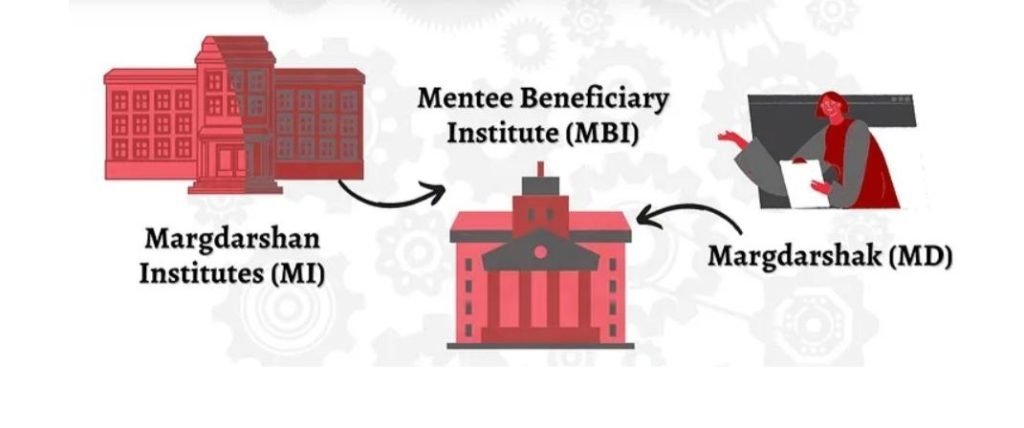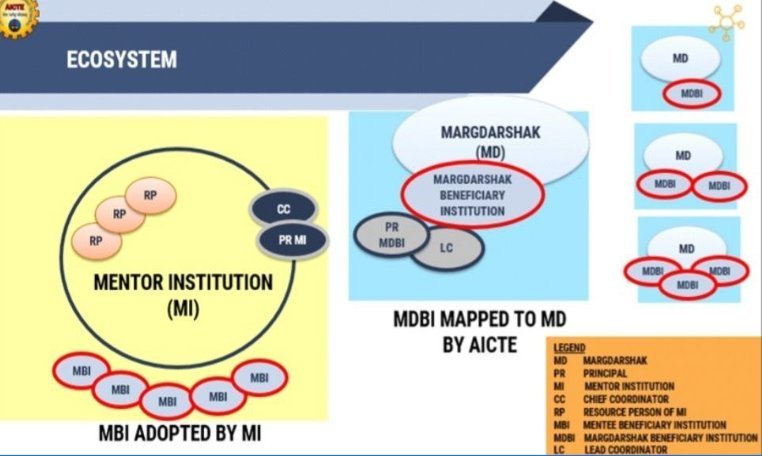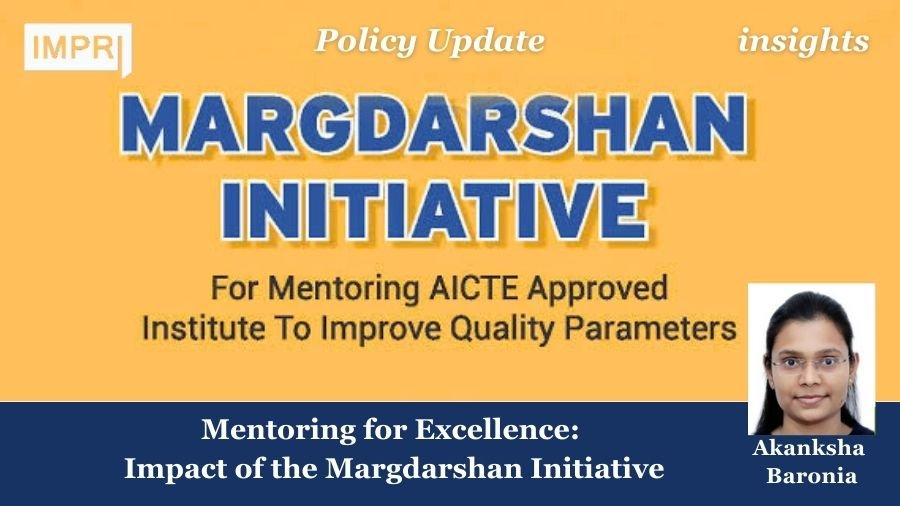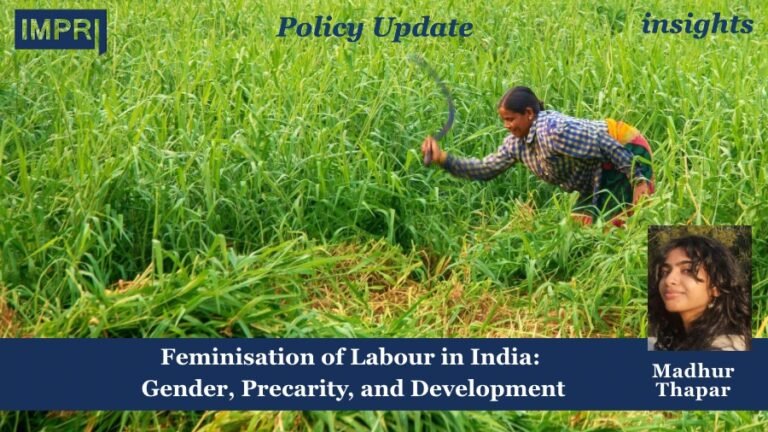Policy Update
Akanksha Baronia
Introduction
India has a large, complex and multi-layered system of technical and higher education. It has the third-largest higher education system in the world, next to China and the United States. The development of human resources of the country is a critical factor for the progress of the Nation. There is an urgent need to move beyond traditional pedagogical approaches and adopt Outcome-Based Education (OBE).
With growing impact at the World stage, India is now a signatory of the Washington Accord for accreditation of engineering degrees. Margdarshan initiative has been introduced by All India Council for Technical Education in 2018 for facilitating the technical institutes in order to improve the quality of technical education as a whole through accreditation by providing access to the facilities available in the host institute.
Background
As per AICTE, there are almost 9000 AICTE approved institutes delivering technical education in the country. However, as per the disclosure by the institutions, only 687 institutions enjoy accreditation. The National Education Policy 2020 has also emphasized the aspect of gaining accreditation.
The existence of institutions without National Board of Accreditation is merely a question of time as eventually those not following the quality mandate shall be faced with the grim prospect of being phased out. To address this gap, the AICTE launched the Margdarshan Initiative as a facilitative mechanism to enhance quality across its approved institutions. It is a facilitative mechanism that aims to foster and augment the support ecosystem in the Institutes approved by AICTE for enhancing their quality across all domains.

Functioning
- A well established AICTE-approved institute referred to as Margdarshan Institute or Mentor Institute(MI) is supported with an objective to mentor up to 10 nearby institutes in achieving the NBA accreditation.
- “Senior academicians, designated as Margdarshan, are nominated to mentor beneficiary institutes and guide them towards achieving NBA accreditation”to act as individual mentors for getting beneficiary institutes to achieve the NBA accreditation and enhance the quality of technical education.
- The ecosystem shall work with Beneficiary Institute(BI) being mentored under the aegis of the MI or MD.
- The participation under Margdarshak Initiative is purely voluntary in nature and activities must be undertaken without any malice or prejudice in the most.
- Regular training sessions, conferences and seminars are organized. Mentor institute help mentee institute through gain in capacity learning, new teaching methods, increase linkages with industries and adopt many digital technologies and mentor institutes also submit quarterly progress report to AICTE.
- AICTE provides funding to the mentor institutions to carry out mentoring activities and mentee institutions should implement reforms as well as recommendations given by the mentor institutions based on the mentor’s guidance.
- Some of the top institutions participating as mentors include: Indian Institute of Technology, National Institute of Technology, Delhi Technological University, etc.

Impact and Performance
- Combined support reached approximately 888 beneficiary institutes.
- At present, 950 institutions are being monitored by well performing top NIRF Ranked Accredited Institutes including some NITs and IITs.
- To connect the institutions and mentors, a portal and an online app has also been developed during the time of COVID-19 Pandemic and orientation programmes were organised online by AICTE.
- Increase in average satisfaction level of the Student, Staff and Faculty.
- Increase in the average score of students participating in tests designed to measure technical and critical thinking skills.
- The scheme sets the stage for an enhancement in the caliber of technical education in our nation. It has garnered enthusiastic participation from technical institutes nationwide.
- Mentor institutions like IIT, and top performing institutes provide guidance to improve their ratings, as well as performance. Many mentee institutes have benefited through this initiative and have reported improvements in academic practices, as well as research culture. These practices may ultimately improve India’s R&D culture, and can lead India to become a competitive economic power.
- Faculty of mentee institutes are trained through workshops and many interactive sessions which ultimately lead to improvement in teaching standards and use of different technology in classrooms.
- Mentee institutes result in improvement in student outcome through skill development and many latest technologies which help them gain more pavement opportunities and the interaction and guidance with the mentor institutes result in more seminar attendance and gain in experience as well as many internship opportunities.
- Several mentee institutes have seen a rise in rating and accreditation scores and ultimately increase in R&D activities.
- This initiative also has long term impact as it contributes towards goal of National Education Policy 2020 which says quality, equity, and access in higher education.
Emerging Issues
- Enrolment of 70% or more and willing to get mentoring through AICTE’s Margdarshaks. Willingness of mentee institutes is taken. However, response giving willingness to be a mentee institute has been received from 400 institutes only to date.
- Limited number of mentee institutes under the mentor institute: As per this limited number of mentee institute can restrict the scheme’s scalability and large number of institutes are seeking accreditation support.
- Variable result: As per the scheme, mentor institute will provide guidance and the best practices to its mentee institute and to help in getting accreditation support but the actual improvement in the mentee institute performance will depend on its own initiative and efforts taken.
- Most mentoring focused on improvement in faculty administration and does not pay attention towards student performance and outcome which is very essential.
- Mentee institutions often lack in implementation instead of good mentorship provided e or lack the skills to implement reforms suggested by mentors. There is a shortage of trained faculty to absorb mentoring, especially in rural areas and towns.
- Limitation at the end of follow up by AICTE to ensure that mentoring outcomes are being achieved. No standard matrices to measure success across institutions.
- Lack of effectiveness on the part of mentor institutions. Not all mentor institutes are equally effective in providing mentorship to the mentee institutes.
- Guidance provided by the mentor institutes is sometimes not context specific or related to the problem faced by the mentee institutes which leads to mismatch between mentor and mentee guidance gap and it is another way of saying that one size fits all mentor institutes approach is not suitable in this case and it act as the limitation in implementing the required result.
- Level of motivation is low on the part of some mentee institutes which leads to inappropriate work done and not following the mentor institutes recommendations.
- Main problem is regarding inadequate funding because of poor financial planning and lack of trained personnel to manage projects.
- No real time performance monitoring of mentoring outcomes.
Way Forward
- Increase the eligibility of mentor institutes so that more mentor institutes can be added under the list and more number of mentee institutes can be provided guidance.
- Best result of accreditation can be shown to mentee institute so that their participation can be increased
- Conduct assessments before assigning mentors and create tailored mentoring roadmaps rather than using a standard framework.
- Provide certificate based on the best adoption of technology and active participation under the guidance of mentor institutes and incentivise faculty champions who recognise and adopt change initially and promote industry academia collaboration in the upskilling of faculty.
- Major problem is related to finance, so simplify the financial reporting process and there should be some autonomy on the part of institutions to allocate funds based on their action plans.
- Introduction of performance linked incentive can also boost the performance where good performing institutions get additional financial support.
- Use third party evaluation process to validate progress and there must be transparency on showing correct data on the dashboards.
References
The Times of India. (2023, September 20). AICTE’s Margdarshan scheme will enable unaccredited technical institutes to get guidance and recognition. The Times of India. https://timesofindia.indiatimes.com/education/news/aictes-margdarshan-scheme-will-enable-unaccredited-technical-get-guidance-and-recognition/articleshow/103787792.cms?utm_source
All India Council for Technical Education. (2022, May 12). Guideline Margdarshan initiative. AICTE.https://www.aicteindia.org/sites/default/files/margdarshak/Guideline%20Margdarshan%20Inititative_12.05.2022_FINAL.pdf
Google Docs. (n.d.). https://share.google/YIGzDPJ4ffgFpiUX0
All India Council for Technical Education. (2022). 2nd quarter newsletter. FlipHTML5.https://fliphtml5.com/jfjx/vzsv/2nd_QTR_NewsLetter_AICTE/?utm_source
About the Author: Akanksha Baronia is currently pursuing a postgraduate degree in Economics from Jawaharlal Nehru University, New Delhi. She is a research intern at IMPRI.
Acknowledgement: The Author sincerely thanks Aasthaba Jadeja and IMPRI team for their valuable contribution.
Disclaimer: All views expressed in the article belong solely to the author and not necessarily to the organisation.




